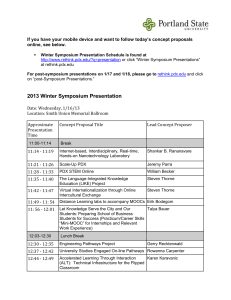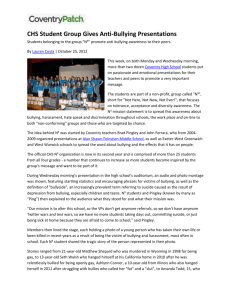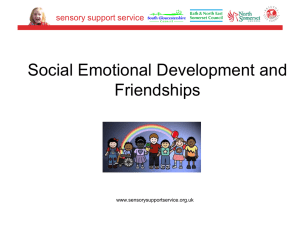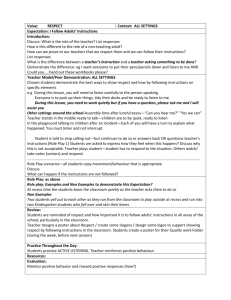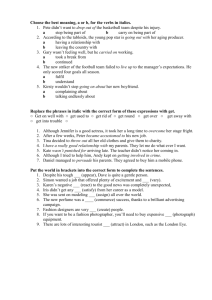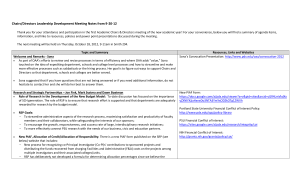destruction & deliverance: my story - Pathways RTC
advertisement
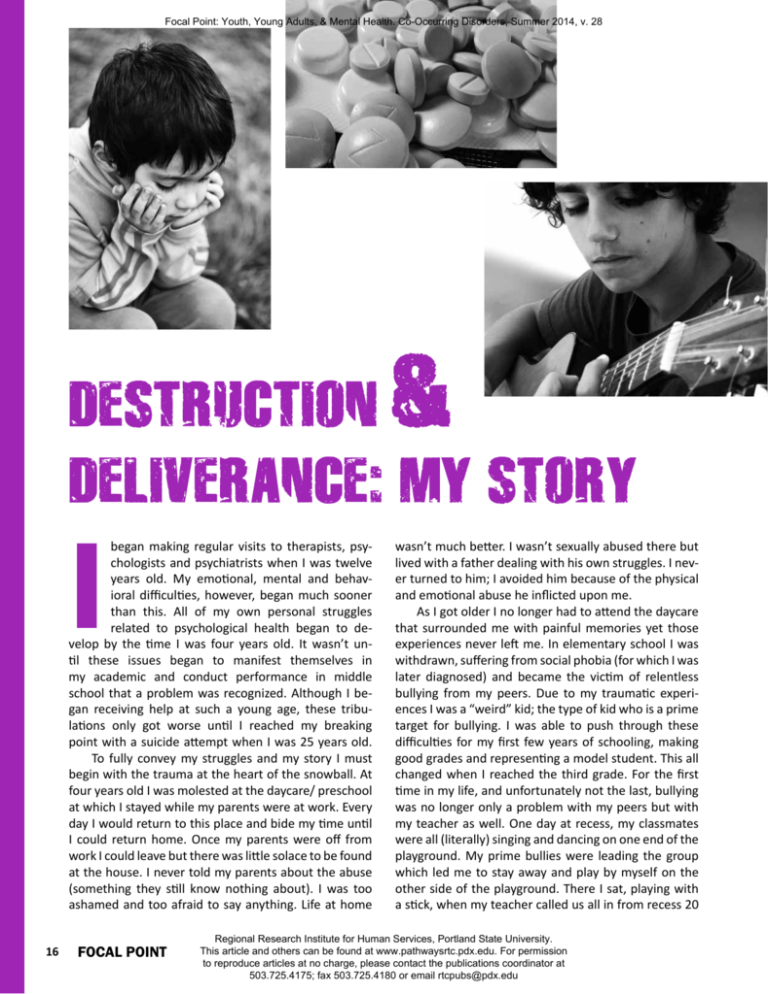
Focal Point: Youth, Young Adults, & Mental Health. Co-Occurring Disorders, Summer 2014, v. 28 & DESTRUCTION DELIVERANCE: MY STORY I began making regular visits to therapists, psychologists and psychiatrists when I was twelve years old. My emotional, mental and behavioral difficulties, however, began much sooner than this. All of my own personal struggles related to psychological health began to develop by the time I was four years old. It wasn’t until these issues began to manifest themselves in my academic and conduct performance in middle school that a problem was recognized. Although I began receiving help at such a young age, these tribulations only got worse until I reached my breaking point with a suicide attempt when I was 25 years old. To fully convey my struggles and my story I must begin with the trauma at the heart of the snowball. At four years old I was molested at the daycare/ preschool at which I stayed while my parents were at work. Every day I would return to this place and bide my time until I could return home. Once my parents were off from work I could leave but there was little solace to be found at the house. I never told my parents about the abuse (something they still know nothing about). I was too ashamed and too afraid to say anything. Life at home 16 FOCAL POINT wasn’t much better. I wasn’t sexually abused there but lived with a father dealing with his own struggles. I never turned to him; I avoided him because of the physical and emotional abuse he inflicted upon me. As I got older I no longer had to attend the daycare that surrounded me with painful memories yet those experiences never left me. In elementary school I was withdrawn, suffering from social phobia (for which I was later diagnosed) and became the victim of relentless bullying from my peers. Due to my traumatic experiences I was a “weird” kid; the type of kid who is a prime target for bullying. I was able to push through these difficulties for my first few years of schooling, making good grades and representing a model student. This all changed when I reached the third grade. For the first time in my life, and unfortunately not the last, bullying was no longer only a problem with my peers but with my teacher as well. One day at recess, my classmates were all (literally) singing and dancing on one end of the playground. My prime bullies were leading the group which led me to stay away and play by myself on the other side of the playground. There I sat, playing with a stick, when my teacher called us all in from recess 20 Regional Research Institute for Human Services, Portland State University. This article and others can be found at www.pathwaysrtc.pdx.edu. For permission to reproduce articles at no charge, please contact the publications coordinator at 503.725.4175; fax 503.725.4180 or email rtcpubs@pdx.edu Focal Point: Youth, Young Adults, & Mental Health. Co-Occurring Disorders, Summer 2014, v. 28 minutes early. Ms. Teacher proceeded to inform the class that recess was cancelled because of my behavior (playing with a stick) and instructed my classmates to “thank” me for “ruining” recess for them. A choir of bitter voices attacked me. That was the moment I learned to hate school and began to give up. For the rest of my time in school, despite having an extremely high IQ and being placed in all of the “academically gifted” classes, I never tried again (at least not until late into college). I remained distanced and withdrawn from my peers, finding solace in playing musical instruments and writing poetry. Engaging in my own artistic pursuits at home was my only escape from the torment of daily life. My father hated this because I was “supposed” to be out playing with other kids and began to beat and batter my instruments just as he would me. At the age of twelve I was old enough to fight back. After I hit my father back in defense I attempted suicide for the first time. I would like to add that after this incident my father took a long look in the mirror and after attempting his own suicide he learned to be the father he never was; he became a happier man and went through his own recovery along with beginning to assist me in my own. From this time in middle school until I went to college I was on more medications than I could name and was in intensive psychiatric counseling. I continued to find peace in the arts and felt a wave of relief when I moved away to attend a university. Upon moving away from home and into a new environment I was filled with hope and great expectations. I got to meet new people who knew nothing about my psychiatric problems and began to make new friends. It wasn’t long, however, until my mental health issues began to become apparent to my new group of “friends” in college. My newly formed personal relationships as well as my academic success began to rapidly deteriorate. I realized that my college peers were no more informed on mental health issues than my primary school classmates when everyone I knew seemed to mistake my name for “crazy.” My new friends, my only friends in the world, would soon invite me for a spring break vacation to promptly uninvite me after a public panic attack. Once the panic attacks began I was prescribed new medications; namely, 3mgs of Xanax a day. Taking them helped me to manage my anxiety but I could still feel the pain of memories. I began taking four to five times my prescribed amount so as to deaden all worries and concerns of both the past and present. I saved them up at first, and then I binged. I bought more from others; I stole them from dorm-room drug dealers. I was strung out every day for three years. Benzodiazepines eliminate all sense of stress, worry and responsibilities. I was living in a day dream and wanted nothing to do with the world outside; I wanted to stay there forever. Needless to say, my grades began slipping until I was kicked out of school and my friends didn’t know me anymore. I was losing everything I had but was too high to notice. After spending so much of my time in a fog, too dense to see the world in front of me, I was running out of places to procure more Xanax. I began to add more drugs into the mix to try and cope with my mental health issues through self-medication. I couldn’t list everything I did for you here because the list would be far too long. I began doing anything I could get my hands on to try and escape life again. One evening, for better or worse, I experienced a horrific “bad trip” on LSD, the first in a dozen to have such an effect. This experience encouraged me to quit using drugs. On the down side, it convinced me that death was a good option. I attempted to take my own life shortly after at the age of 25 by drinking a bottle of gin and skateboarding downhill on a five lane road into oncoming traffic. I’ve always heard that facing one’s own death can permanently change a person. I consider this to be the most positive directionchanging moment of my life. I’ve always heard that facing one’s own death can permanently change a person and after a few weeks in the hospital recovering from my attempt, I now understand this saying. Not succeeding in my suicide gave me a new lease on life. For the first time in over two decades I was ready to appreciate both the world around me and within myself. I could enjoy sunsets and flowers and finally realize the beauty of life. Feeling renewed, I learned how to grow personally and use my own experiences to help both myself and others. I became heavily involved in my own recovery, eventually joining advocacy groups and becoming a Certified Peer Support Specialist, all within a year of my attempt. I now help others, professionally, using my story. Working with others who are struggling serves as a reminder of how precious my life is. Education, compassion and understanding from other people are the reasons that I’m able to type this right now. AUTHOR Milo Rymes is a Certified Peer Support Specialist, Youth Advocate and artist. Regional Research Institute for Human Services, Portland State University. This article and others can be found at www.pathwaysrtc.pdx.edu. For permission to reproduce articles at no charge, please contact the publications coordinator at 503.725.4175; fax 503.725.4180 or email rtcpubs@pdx.edu FOCAL POINT 17
